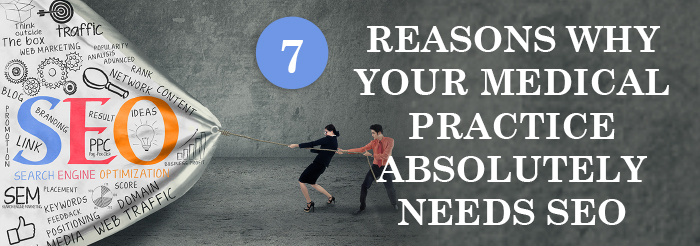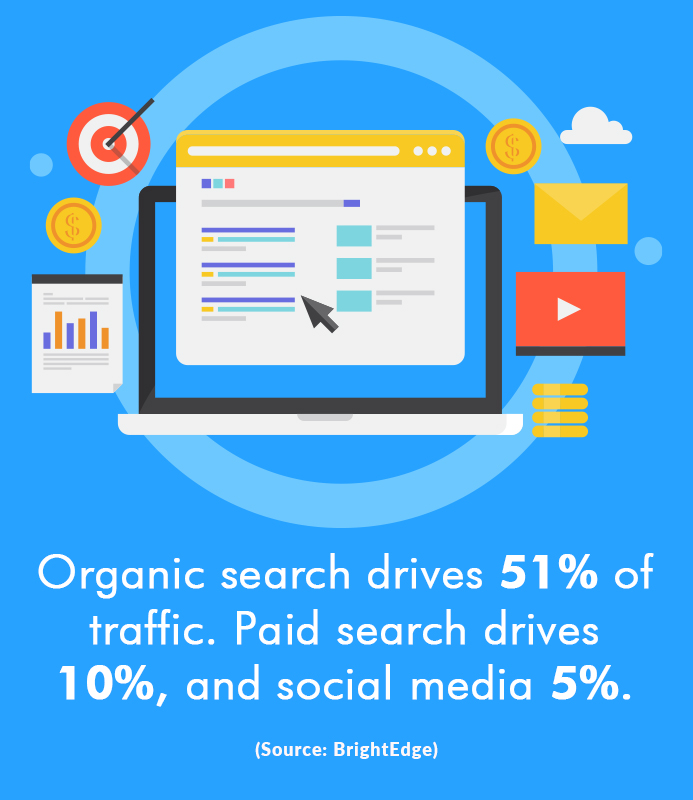7 Reasons Why Your Medical Practice Absolutely Needs SEO
Posted on
Today’s patients rely on search engines to help them find everything from restaurant recommendations to B2B software providers.
This means, regardless of what your medical practice offers, your target audience is probably searching for services like yours on search engines like Bing and Google. And if you want to attract qualified leads to your healthcare website, you need search engine optimization (SEO).
An Introduction to Healthcare SEO
SEO is a strategy for improving your healthcare website’s rankings in search engine results. It involves identifying the relevant phrases and keywords your target audience might use when looking for services like yours, then working toward improving your rankings for those searches.
Of course, this is a necessary explanation – and you can check out our other blogs on healthcare SEO for a more in-depth understanding.

Why Does Your Website Need SEO?
SEO is an integral part of any effective healthcare marketing strategy. But to illustrate its importance, let’s go over some of the key reasons you should be optimizing your website.
1. It helps build your brand
Although healthcare branding is a traditional marketing strategy, while SEO falls into the digital marketing category, the two involve similar steps.

Building a healthcare brand requires considering the services you provide and how your target audience perceives them.
And when you look at the strategies involved in optimizing a healthcare website, they are mostly similar. You need to create content that is in line with your target audience’s interests and needs and then find ways to earn valuable links to that content from other relevant healthcare websites.
If you keep this relationship in mind while developing your SEO strategy, you can create keyword-optimized content that will appeal to your target audience.

2. An optimized website attracts relevant visitors
On the surface, the goal of SEO is to improve your website’s rankings in search engine results. But the broader purpose is to attract more traffic – and, ideally, to convert that traffic into patients.
If you want to attract more patients to your website, healthcare SEO is the best way to accomplish this goal.
3. You don’t have to pay for expensive ad space

This reason is also one of the most significant advantages of SEO.
Consider how traditional marketing strategies work:
You determine a medium or channel you want to promote your brand, whether that’s in a particular newspaper or on a TV channel. Then, you pay for the promotion. You might pay for your advertisements to run for a certain period or a certain number of times. As soon as that specific period is up, your brand promotion stops. And when the promotion stops, it also stops generating revenue or results for your medical practice.
Now, consider search engine pages.
The top two or three listings on each page are pay-per-click (PPC) ads. Obviously, there are costs involved with these ads. But you must also know that you only pay when a patient clicks an ad and visits your website. This gives PPC an edge over traditional marketing ads.
But the results appearing in organic search, directly below PPC ads, aren’t costing a cent for their placement.
While a significant amount of time and money must have been invested into creating the content or pages that are ranking in those spots, they appear on the first two pages because Google thinks they provide value to their target audience.
As a result, they earn traffic without spending a dime.

4. It helps the target audience find your practice website
SEO can help your medical practice get in front of your target audience as they are actively searching for information.
And considering how common it is for patients to use search engines to find information about services, this is a massive opportunity. In fact, the majority of patients turn to search engines first when they want to learn more about a new medical practice.
This means, if you want your medical practice to be part of a patient’s online research process, it must show up in search results for keywords related to the services you offer. In addition, most potential patients would prefer to visit your official website to learn more about your services. Therefore, having a robust online presence will not only help you achieve healthcare marketing goals but will also allow the target audience to research in a way that works for them.
5. It boosts your domain authority and credibility
The digital revolution has drastically changed what the sales process looks like for many medical practices.
That’s because today, patients have access to a wealth of resources that can help them learn about their options before they speak with your staff. And with SEO, you can become part of that learning process.
That’s especially true if you combine SEO strategies with content marketing tricks. When you create valuable content, you have the opportunity to build trust with potential patients early in the research phase.

How patients do research?
First, a patient finds your website by searching on the Internet and seeing content related to your medical practice or services in the search engine results.
If they like the information, they might share it with friends and visit your website. This is where the process might slow down a bit. The same patient might return to your website several times without taking action. You might find this frustrating, but this is the typical buying process.
However, with each piece of content they read, you will be establishing your brand as a credible source of information. When the patient is finally ready to call your office for an appointment, he or she will know exactly what to expect.
6. It can help you stay ahead of the competition
As you optimize your healthcare website, you are not just working to improve its ranking on results pages but also moving it above your competitors’ ranking.
Keep in mind that the first result on the first page of search engine results gets the maximum clicks. From there, the number of clicks decreases page after page. This is mainly because users don’t want to scroll or jump from one page to another.
This means that when you move up in search engine results, you earn a more significant percentage of the clicks for your keywords – and your competitors earn less.
7. It improves patient experience
Google’s goal is to provide the best possible search results to its users. As a result, its algorithms focus on making sure they are directing searchers to websites that provide not only valuable content but also an excellent experience. That’s why factors like mobile-friendliness, usability and website load speed play a significant role in search rankings.
While this means that optimizing your healthcare website might require professional help, it also means that you will be continually improving the patient experience your website provides. And when you consider the impact that patient experience has on conversions, this can have a significant effect on your bottom line in the long run.

Conclusion
The best thing about healthcare SEO is that it is a dynamic strategy; it can be changed with changes in requirements.
While the techniques and methodologies may not change much, their application will evolve to meet your requirements.
What makes healthcare SEO the most dynamic and reliable strategy is that it acknowledges its uncertainty of the healthcare market.
Similarly, your medical practice marketing strategy must also be dynamic. These should never be static in this ever-changing world of the Internet. Highly measurable SEO can be evaluated, assessed, and revised to reflect shifts in the uncertain healthcare market.

 What Are the First Steps When Planning a New Websi..
What Are the First Steps When Planning a New Websi.. SEO Strategies to Rank Your Dental Practice
SEO Strategies to Rank Your Dental Practice How AI is Driving Patient Engagement and Revolutio..
How AI is Driving Patient Engagement and Revolutio..